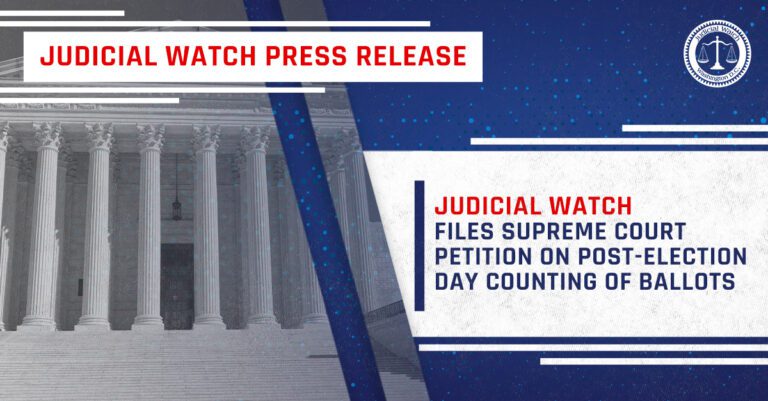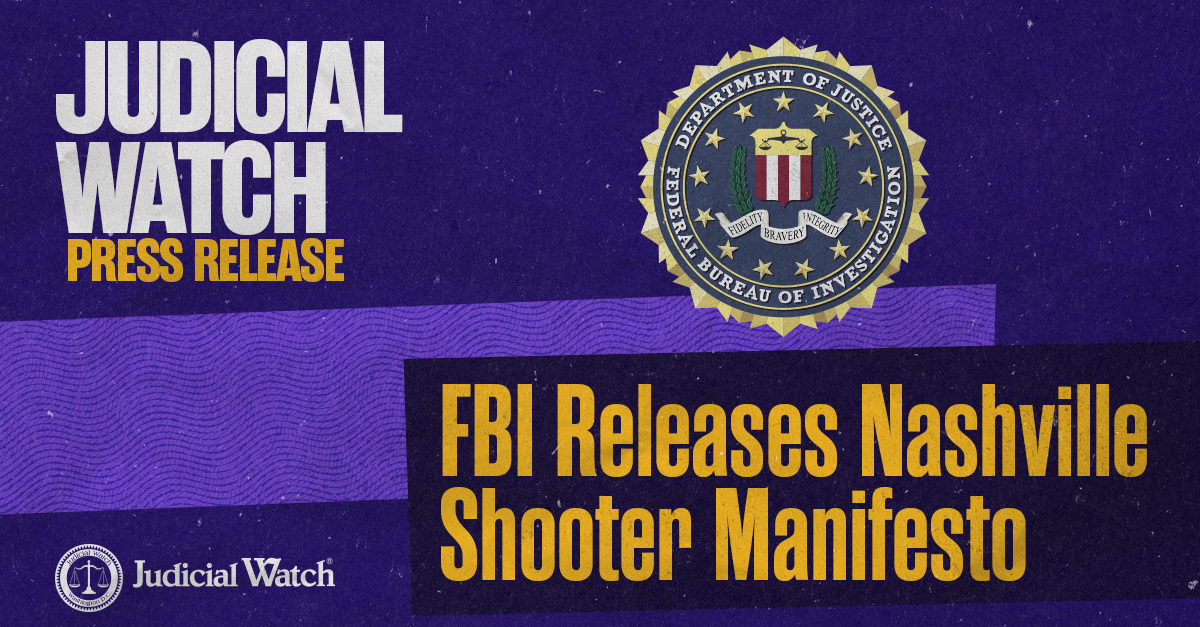
Judicial Watch Files Supreme Court Petition on Post-Election Day Counting of Ballots

(Washington, DC) – Judicial Watch announced today that it filed a petition for a writ of certiorari to the United States Supreme Court challenging the decision by the U.S. Court of Appeals for the Seventh Circuit in the case filed on behalf of Congressman Mike Bost and two presidential electors from Illinois to prevent state election officials from extending Election Day for 14 days beyond the date established by federal law (Rep.Michael J. Bost, Laura Pollastrini, and Susan Sweeney v. The Illinois State Board of Elections and Bernadette Matthews (No. 1:22-cv-02754, 23-2644)).
The lawsuit was filed on May 25, 2022.
Federal law defines Election Day as the first Tuesday after the first Monday in November of every even-numbered year. The initial complaint states: “Despite Congress’ clear statement regarding a single national Election Day, Illinois has expanded Election Day by extending by 14 days the date for receipt and counting of vote-by-mail ballots.” The Court of Appeals for the Fifth Circuit just ruled in another Judicial Watch lawsuit, which was filed on behalf of the Libertarian Party of Mississippi, that counting ballots received after Election Day is unlawful.
Illinois election law allows vote-by-mail ballots received up to 14 days after the polls close on Election Day to be counted as if they were cast and received on or before Election Day. Illinois law also provides that “[e]ven vote-by-mail ballots without postmarks shall be counted if received up to 14 calendar days after Election Day if the ballots are dated on or before Election Day.” In a split decision, a Seventh Circuit appellate court panel found that Congressman Bost had no standing to challenge the provision, despite the increased costs and injuries to him caused by the two-week counting of ballots that arrive after Election Day.
In its petition to the U.S. Supreme Court, Judicial Watch states:
For over 130 years, this Court has heard claims brought by federal candidates challenging state time, place, or manner regulations affecting their federal elections. Until recently, it was axiomatic that candidates had standing to challenge these regulations. Indeed, “it’s hard to imagine anyone who has a more particularized injury than the candidate has.” … That is because a candidate who “pours money and sweat into a campaign, who spends time away from her job and family to traverse the campaign trail, and who puts her name on a ballot has an undeniably different— and more particularized—interest in the lawfulness of the election” than “some random voter.”
***
Petitioners are a sitting multi-term Congressman and two federal electors. They challenged an Illinois law (the “Receipt Deadline”) that allows absentee ballots to be received and counted after the day specified in federal statutes for holding federal elections (“Election Day”). They contend that Illinois’ Receipt Deadline is preempted by the federal Election Day statutes.
***
This petition presents an opportunity for the Court to provide lower courts and litigants much needed guidance on candidate standing, outside of the high-stakes, emergency, post-election litigation where these issues commonly arise.
“It is a scandal that the courts would deny a federal candidate the ability to challenge an election provision that could lead to illegal votes being cast and counted,” said Judicial Watch President Tom Fitton. “Illinois’ 14-day extension of Election Day thwarts federal law, violates the civil rights of voters, and invites fraud. The Supreme Court should take up this case and reaffirm the right of federal candidates to challenge unlawful election schemes.”
Judicial Watch is a national leader in voting integrity and voting rights. As part of its work, Judicial Watch assembled a team of highly experienced voting rights attorneys who stopped discriminatory elections in Hawaii, and cleaned up voter rolls in California, Ohio, Indiana, and Kentucky, among other achievements.
Robert Popper, a Judicial Watch senior attorney, leads its election law program. Popper was previously in the Voting Section of the Civil Rights Division of the Justice Department, where he managed voting rights investigations, litigations, consent decrees, and settlements in dozens of states.
In May 2024, Judicial Watch sued California under the National Voter Registration Act of 1993 (NVRA) to force it to clean up its voter rolls. The lawsuit, filed on behalf of Judicial Watch and the Libertarian Party of California, asks the court to compel California to make “a reasonable effort to remove the registrations of ineligible registrants from the voter rolls” as required by federal law (Judicial Watch Inc. and the Libertarian Party of CA v. Shirley Weber et al. (No. 2:24-cv-3750)).
In March 2024, Judicial Watch, Breakthrough Ideas, Illinois Family Action, and Carol J. Davis sued Illinois officials under the NVRA to force them to clean the State’s voter rolls. (Judicial Watch Inc., et al., v. Illinois State Board of Elections, et al. (No. 1:24-cv-01867).
In December 2023, a notice letter was sent to election officials in the District of Columbia notifying them of evident violations of the NVRA, based on their failure to remove inactive voters from their registration rolls. The letter pointed out that D.C. publicly reported removing few or no ineligible voter registrations under a key provision of the NVRA. The letter threatened a federal lawsuit unless the violations were corrected in a timely fashion. In response to Judicial Watch’s inquiries, Washington, DC, officials admitted that they had not complied with the NVRA, promptly removed 65,544 outdated names from the voting rolls, promised to remove 37,962 more, and designated another 73,522 registrations as “inactive.”
In July 2023 Judicial Watch filed an amicus curiae (friend of the court) brief, supporting the decision of the U.S. District Court for the District of Maine, which struck down Maine’s policy restricting the use and distribution of the state’s voter registration list (Public Interest Legal Foundation v. Shenna Bellows (No. 23-1361). According to a national study conducted by Judicial Watch in 2020, Maine’s statewide registration rate was 101% of eligible voters.
Judicial Watch in July 2023 also settled a federal election integrity lawsuit on behalf of the Illinois Conservative Union against the state of Illinois, the Illinois State Board of Elections, and its director, which now grants access to the current centralized statewide list of registered voters for the state for the past 15 elections.
In April 2023, Pennsylvania settled with Judicial Watch and admitted in court filings that it removed 178,258 ineligible registrations in response to communications from Judicial Watch. The settlement commits Pennsylvania and five of its counties to extensive public reporting of statistics regarding their ongoing voter roll clean-up efforts for the next five years.
In March 2023, Colorado agreed to settle a Judicial Watch NVRA lawsuit alleging that Colorado failed to remove ineligible voters from its rolls. The settlement agreement requires Colorado to provide Judicial Watch with the most recent voter roll data for each Colorado county each year for six years.
In February 2023, Los Angeles County confirmed the removal of 1,207,613 ineligible voters from its rolls since last year, under the terms of a settlement agreement in a federal lawsuit Judicial Watch filed in 2017.
Judicial Watch settled a federal election integrity lawsuit against New York City after the city removed 441,083 ineligible names from the voter rolls and promised to take reasonable steps going forward to clean its voter registration lists.
Kentucky also removed hundreds of thousands of old registrations after it entered into a consent decree to end another Judicial Watch lawsuit.
In February 2022, Judicial Watch settled a voter roll clean-up lawsuit against North Carolina and two of its counties after North Carolina removed over 430,000 inactive registrations from its voter rolls.
In March 2022, a Maryland court ruled in favor of Judicial Watch’s challenge to the Democratic state legislature’s “extreme” congressional-districts gerrymander.
Christine Svenson, Esq., of Svenson Law Offices in Palatine, Illinois, is assisting Judicial Watch with the lawsuit.
###
















